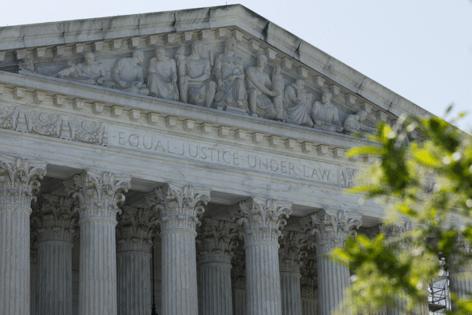Supreme Court upholds for now Trump's firing of two independent agency officials
Published in Political News
WASHINGTON — The Supreme Court on Thursday upheld, for now, President Donald Trump's decision to fire two agency officials who had fixed terms that were set by Congress.
By a 6-3 vote, the justices set aside rulings that would have reinstated Gwynne Wilcox to the National Labor Relations Board and Cathy Harris to the Merit Systems Protection Board. Both were appointees of President Joe Biden.
The decision is the latest in which the court's conservative majority sided with the president's power to fire agency officials in violation of long-standing laws.
"Because the Constitution vests the executive power in the President, he may remove without cause executive officers who exercise that power on his behalf," the court said in an unsigned order.
But the justices were quick to add the Federal Reserve Board is not affected by this decision.
"The Federal Reserve is a uniquely structured, quasi-private entity that follows in the distinct historical tradition of the First and Second Banks of the United States," the court said.
Trump has threatened to fire Fed Chair Jerome Powell, whose term extends to next year.
At issue is a fundamental dispute over whether the Constitution gave the president or Congress the power to set the structure of the federal government.
In 1935, the court ruled unanimously that Congress can create independent and "nonpartisan" boards and commissions whose members are appointed by the president for a fixed term. The court then drew a distinction between "purely executive officers" who were under the president's control and members of boards whose duties were more judicial or legislative.
But in recent years, conservatives have questioned that precedent and argued that the president has the executive power to hire and fire all officials of the government.
Shortly after taking office, Trump fired Wilcox and Harris even though their terms had not expired. They sued contending the firings were illegal and violated the law.
They won before a federal judge and the U.S. court of appeals.
Those judges cited the Supreme Court's 1935 decision that upheld Congress' authority to create independent boards whose members are appointed by the president to serve a fixed-term.
Trump's lawyers say the Constitution gives the president full executive power, including control of agencies. And that in turns gives him the authority to fire officials who were appointed to a fixed term by another president, they said in Trump vs. Wilcox.
Justice Elena Kagan filed an eight-page dissent joined by Justices Sonia Sotomayor and Ketanji Brown Jackson.
"Today's order favors the President over our precedent; and it does so unrestrained by the rules of briefing and argument — and the passage of time— needed to discipline our decision-making," Kagan wrote. "I would deny the President's application. I would do so based on the will of Congress, this Court's seminal decision approving independent agencies' for-cause protections, and the ensuing 90 years of this Nation's history."
The court said its decision was not final.
The NLRB was created by Congress in 1935 as a semi-independent agency tasked with enforcing the labor laws. Its general counsel serves as a prosecutor while the board's five members act as judges who review administrative decisions arising from unfair-labor claims brought by unions.
Under the law, the president appoints the general counsel who can be fired but board members have five-year terms. They may be fired for "neglect of duty or malfeasance in office," but not simply because of political disagreements.
Trump could have controlled the board by appointing members to fill two vacancies. He chose instead to fire Wilcox, leaving the board without a quorum of three members.
Wilcox argued there was no reason to rush to change the law.
"Over the past two centuries, Congress has embedded modest for-cause removal restrictions in the structure of numerous multi-member agencies," she said in response to the administration's appeal. She noted that all past presidents — Republicans and Democrats — did not challenge those limits.
The Merit System Protections Board was created by Congress in 1978 as a part of a civil service reform law. Its three board members have seven-year terms, and they review complaints from federal civil servants who allege they were fired for partisan or other inappropriate reasons.
Trump's decision to fire Harris also left the board without a quorum.
©2025 Los Angeles Times. Visit latimes.com. Distributed by Tribune Content Agency, LLC.

























































Comments